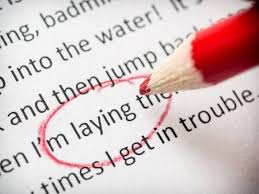
During my years as an English professor, I read thousands of pages of student writing. I had several tasks as I did that. I needed to respond to the ideas in the writing. I needed to correct spelling, grammar and usage issues in the writing. I needed to assign a letter grade to the writing, an evaluation of how clearly the student had expressed herself in the writing. Some teachers gave separate grades for content and mechanics, but I saw the two as essentially intertwined. Good ideas are smothered under poor sentence construction and confusing grammar.
Responding to blog posts differs in an important way from grading papers. I am privileged to read writings from all over the globe, rarely written by professional writers. Because I have a firmly established habit of always responding to the writing before me, I nearly always comment on each post I read. But I am only reacting to the content of the post, not its mechanics, grammar or clarity. As long as I can connect with the post, I can respond truthfully and kindly. Bloggers aren’t asking for editing or grading, we want an audience for our posts. Few of us go to the trouble of keeping a blog without hoping at least one person will read it.
As I wrote earlier this year, I am happy to help anyone with editing if they ask for it. I will do this without charge, simply passing on the benefits from years of teaching. But bloggers can be sure of encouragement and good wishes from me in the comment section. We all write with trepidation, hoping we will be understood. And I will consistently seek to understand and appreciate each person’s words. And again I thank everyone who leaves me a comment after they read what I have written.

Reading without editing can be difficult at times. Commenting can make a day better. Such a small thing we can do for each other takes so little effort. Thanks for what you’re doing.
LikeLike
You are welcome.
LikeLike
I agree that we all wish to be understood. But sometimes I fear, that often, our poor grammar clouds the issue and makes our content hard to understand. I am certainly aware that often, when I look back over posts, had I written better what I wanted to say might have been easier to understand. Practice probably helps but only when we get to know our mistakes. The painless way, however, to improve is to read the produce of others. Blogs like your own are great examples of how to be crystal clear – thanks.
LikeLike
Thank you for your kind words. I think most writers benefit from reading. I read widely and always have, so my prose reflects that , I hope.
LikeLike
Very heartwarming, Elizabeth😍❤I will take you up on this offer😀😀
LikeLike
You can send me any work you want edited to betsyfrompike@earthlink.net
LikeLike
Thank you, Elizabeth ❤
LikeLike
Yes, I agree Elizabeth, it is so very encouraging to receive a comment.
Jennifer
LikeLike
I am taking a history class this semester at the university where I work and so am back into assignments that involve writing. It’s not something I have a lot of experience, good at nor actually love to do. Due dates add some stress to that. But writing does intrigue me for purposes of expressing myself here and possibly writing a memoir.
I would appreciate any tips/links you might have about writing my own memoir and/or about writing stories about my parents and grandparents. I’d like to leave something for my daughter about myself and my family background.
LikeLike
Just write me at betsyfrompike@earthlink.net and I would be happy to exchange ideas as you move forward with your writing.
LikeLike
Insightful and generous Elizabeth. Your words of encouragement have meant a lot to me over the past two years.
LikeLike
I am glad.
LikeLike
Wow! That’s very kind of you. I’m gonna let you know when I have something. Thanks a lot.
LikeLike